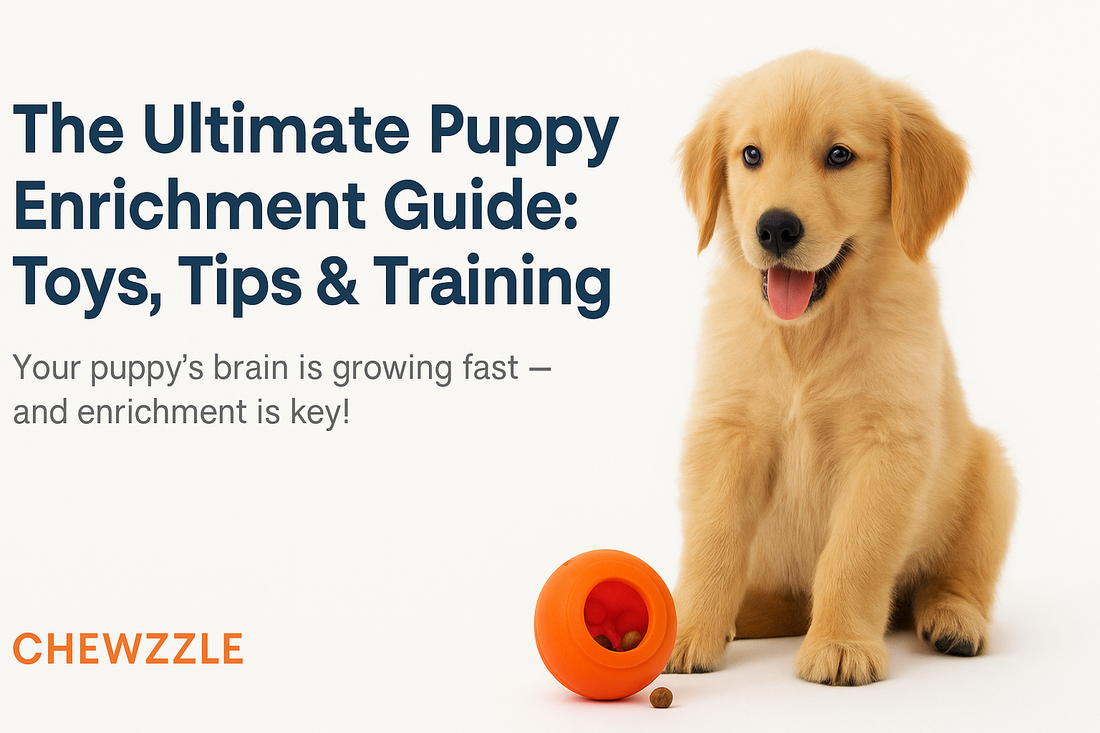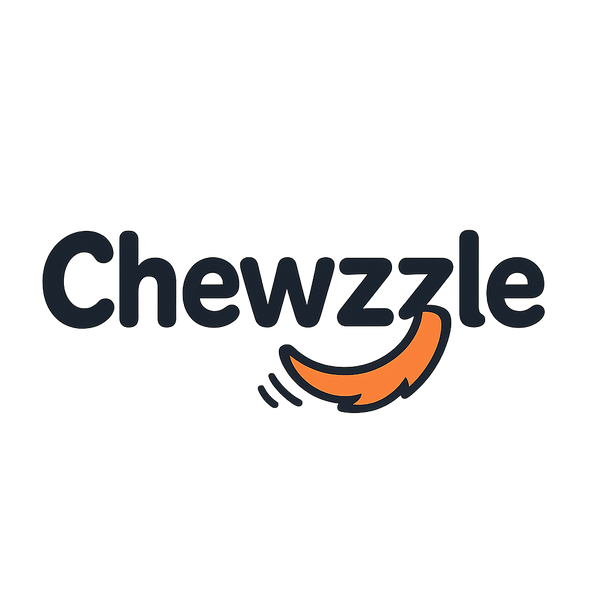
The Ultimate Puppy Enrichment Guide: Toys, Tips & Training
Share
The Ultimate Puppy Enrichment Guide: Toys, Tips & Training
Your puppy’s brain is growing fast — and enrichment is key! Whether you’re raising a rambunctious retriever or a thoughtful little terrier, one thing is certain: puppies thrive when their minds are challenged and their environment supports learning.
At Chewzzle, we believe enrichment isn’t a luxury — it’s a fundamental part of raising a well-rounded, emotionally healthy dog. The good news? It’s not complicated. With the right toys, a few smart routines, and basic training, you can help your puppy grow into a confident, calm, and clever companion.
This guide will walk you through:
-
Why enrichment matters
-
The best puzzle and training toys for puppies
-
Easy enrichment activities to start today
-
Tips for building habits that last a lifetime
🐶 Why Puppy Enrichment Matters
Puppies experience a critical window of brain development between 8 and 16 weeks. During this time, their minds are like sponges — rapidly absorbing information, behaviors, and emotional responses that shape them into adult dogs.
Enrichment helps by:
-
Strengthening brain development
-
Preventing boredom and destructive behavior
-
Supporting social confidence and emotional regulation
-
Teaching problem-solving and independence
Dogs that don’t receive enough mental stimulation early on may become anxious, easily frustrated, or hyperactive — which can lead to lifelong behavioral challenges.
🧠 What Is Puppy Enrichment, Exactly?
Enrichment means giving your puppy experiences that challenge their brain, body, and senses in safe, rewarding ways. That includes:
-
Puzzle toys
-
Training games
-
New sounds, smells, and textures
-
Exploration and supervised independence
-
Scent-based play and treat finding
-
Interactive feeding
At Chewzzle, we focus on enrichment that feels like play, but builds skills — especially with our line of puzzle toys for puppies.
🧩 Best Puzzle Toys for Puppies
When choosing enrichment toys, look for safe materials, age-appropriate challenge, and interactive rewards like treats or kibble.
Here are 3 Chewzzle favorites for young minds:
✅ 1. IQ TreatBall – Beginner Puzzle Feeder
Perfect for puppies just starting out. This rolling treat-dispensing ball encourages movement and problem-solving while slowing down meals.
Why it works:
-
Mentally engaging
-
Encourages independent play
-
Helps prevent gulping food too fast
✅ 2. Snuffle Mat or Forage Ball
Soft fleece snuffle toys encourage your pup to use their nose — a dog’s strongest sense. Hide kibble or small treats for them to find through sniffing and gentle foraging.
Why it works:
-
Scent stimulation builds confidence
-
Keeps puppies calm and focused
-
Great for rainy days or crate time
✅ 3. SmartFeeder Maze Bowl
Combines slow feeding with enrichment. Your puppy must work around ridges and grooves to reach their food, reducing fast eating and boosting focus.
Why it works:
-
Slows digestion for growing tummies
-
Makes every meal an enriching experience
-
Prevents boredom during feeding
🐾 Training Games That Double as Enrichment
Enrichment doesn’t stop at toys — it’s also in the way you interact. Training sessions with your puppy can be both mentally challenging and deeply bonding.
Try these short, rewarding activities:
🎯 1. Name Recognition Game
Say your pup’s name excitedly. When they turn to you, reward them with a treat or toy. Helps with focus and building recall.
🧺 2. Tidy Up
Encourage your puppy to bring a toy back to a basket or mat. Praise heavily for any attempt. Over time, they learn a mini “clean-up” routine!
🐕 3. "Find It" Game
Toss a small treat just out of sight and say “Find it!” Let your pup sniff and explore. Builds problem-solving and scent tracking skills.
Training Tip:
Keep sessions short (3–5 minutes), positive, and always end on a high note. Puppies learn best when they feel successful.
🗓️ Daily Enrichment Routine (Sample Schedule)
Structure is key — and your puppy will love it. Here's a sample daily enrichment plan:
| Time of Day | Activity |
|---|---|
| Morning | Puzzle toy breakfast (e.g. TreatBall) |
| Mid-Morning | Short leash walk + basic training |
| Afternoon | Nap + snuffle toy in crate |
| Evening | Play session + new chew toy |
| Before Bed | “Find It” game or calming puzzle |
Tip: Swap toys every few days to keep things novel and exciting without overwhelming your pup.
💬 Real Talk: Common Enrichment Questions
Q: What if my puppy gets frustrated with puzzle toys?
Start with simpler toys like snuffle mats or low-resistance treat balls. Always supervise the first few sessions and offer encouragement.
Q: How long should my puppy use a puzzle toy?
5–15 minutes is a great start. Watch your pup’s energy and attention — every dog is different.
Q: Is enrichment only for energetic breeds?
Nope! Every dog benefits from enrichment. Calm puppies still need mental stimulation to build confidence and reduce reactivity later in life.
💡 Chewzzle Tips for Long-Term Success
-
Celebrate curiosity. If your pup sniffs, paws, or circles a toy — praise them! They’re learning how to engage.
-
Don’t overdo it. Too much challenge too soon can cause frustration. Gradually build up toy difficulty.
-
Use food as a tool. Feeding through toys (instead of bowls) helps reinforce enrichment naturally.
-
Rotate often. Just like kids, puppies get bored. Swapping toys weekly keeps things fresh.
🎉 Final Thoughts: Smart Puppies, Happy Humans
The best thing you can do for your puppy — besides love and cuddles — is help them learn how to explore, problem-solve, and build confidence in a safe environment.
Enrichment isn’t complicated — it’s intentional.
And at Chewzzle, we make that easy with safe, fun, thoughtfully designed puzzle toys that grow with your pup.
So whether your puppy is a shy snuggler or a bold explorer, one thing’s for sure:
Smart play today means a happier dog tomorrow.
🧠🐶 Ready to get started? Shop our Puppy Puzzle Collection
